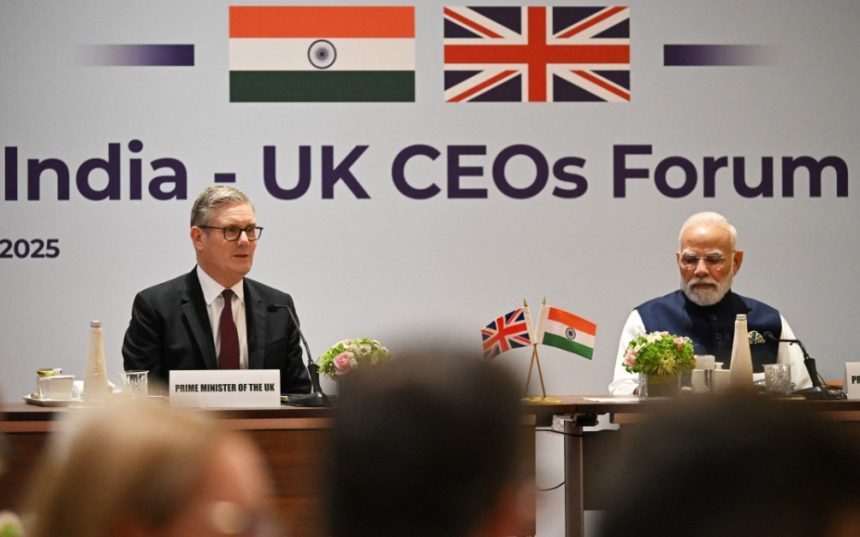UK–India Relations Reach New Heights as Keir Starmer and Narendra Modi Celebrate Landmark Trade Deal
In a corner moment for UK-India relations, Prime Minister Keir Starmer and his Indian counterpart Narendra Modi have saluted the recently sealed trade agreement between their nations.
The deal, which promises a swell in bilateral trade and investment, was the centrepiece of Starmer’s high-profile visit to Mumbai, a visit that marks a renewed period of strategic cooperation.
During the talks, Downing Street unveiled a £1.3 billion package of fresh Indian investments in the UK. The move signals growing confidence from Indian enterprises in Britain’s post-Brexit economy.
In return, the UK government confirmed a £350 million contract to supply the Indian Army with Lightweight Multirole Missiles manufactured in Northern Ireland, a significant stride in defence cooperation.
The rearmost pact builds upon a trade deal inked in July, designed to cut tariffs on whisky, buses, and fabrics while targeting an increase of£ 25.5 billion in bilateral trade by 2040.
Following their discussions, Narendra Modi remarked that Starmer’s visit “reflects the new energy and broad vision” driving the UK-India relationship, highlighting how “India’s dynamism and the UK’s expertise create a unique synergy.”
The path-breaking India-UK CETA will create new job opportunities for youth, expand trade and benefit both our industries as well as consumers. In this context, PM Starmer and I discussed trade linkages and economic ties between our nations in the times to come. @Keir_Starmer pic.twitter.com/zs5obf7Hh7
— Narendra Modi (@narendramodi) October 9, 2025
Starmer echoed the sentiment, emphasising the deal’s potential to boost employment and innovation on both sides. “Thousands of high-skilled jobs” are expected to emerge once the agreement comes into effect next year.
Travelling with over a hundred business and academic leaders, Starmer’s trip marks the largest British business delegation ever transferred to India.
Representatives from technology, education, and artistic sectors joined him, motioning a comprehensive approach to strengthening ties beyond just trade.
The UK Prime Minister also raised support for India’s shot for an endless seat on the United Nations Security Council, emphasising Britain’s intent to consolidate cooperation on the global stage.
Starmer’s office confirmed that 64 Indian companies would inject the new £1.3 billion into various British industries, from clean energy to artificial intelligence and higher education.
Both governments also outlined technology, defence, and sustainability as priority areas for joint growth.
Before returning to London later today (9 October), Starmer and Modi are set to attend a financial technology conference, further cementing economic and digital collaboration between the two democracies.
This deal is being viewed as more than just a trade milestone, it’s a statement of intent. A signal that both London and New Delhi are ready to forge a modern alliance built on shared innovation, sustainability, and mutual respect.
For Starmer, this visit has not only strengthened Britain’s global trade agenda but also rekindled one of its most promising international partnerships.






